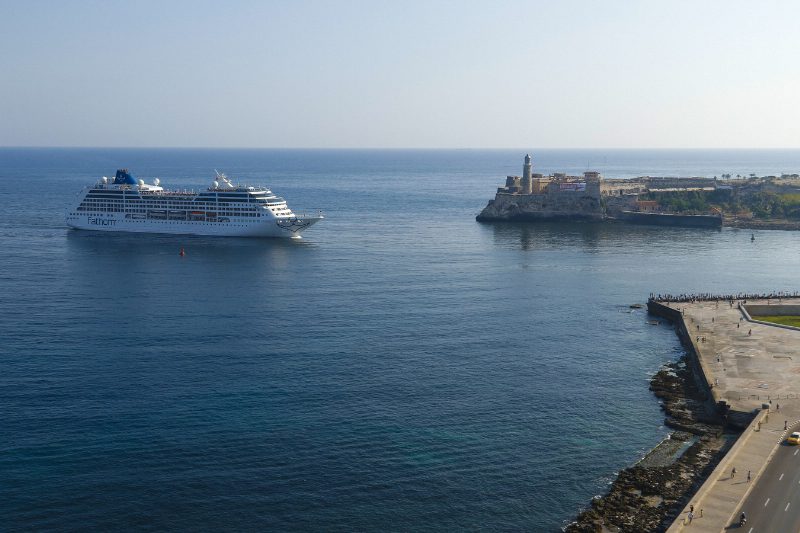People look at the arrival of U.S. Carnival cruise ship Adonia at the Havana Bay, May 2, 2016. The ship was the first cruise liner to sail between the United States and Cuba since Cuba’s 1959 revolution. Photo: Carnival Corp

 By Sarah Marsh and Marc Frank HAVANA, June 4 (Reuters) – The Trump administration on Tuesday imposed heavy new restrictions on travel to Cuba by U.S. citizens, including a ban on cruises, in a bid to further pressure the Communist island over its support for Venezuelan President Nicolas Maduro.
By Sarah Marsh and Marc Frank HAVANA, June 4 (Reuters) – The Trump administration on Tuesday imposed heavy new restrictions on travel to Cuba by U.S. citizens, including a ban on cruises, in a bid to further pressure the Communist island over its support for Venezuelan President Nicolas Maduro.
The tightening of the decades-old U.S. embargo on the Caribbean’s largest island will further wound its crippled economy as well as hurt U.S. travel companies that had built up business with Cuba during a brief 2014-2016 detente under former President Barack Obama.
The State Department said the United States would no longer allow so-called group people-to-people educational travel, one of the most popular exemptions to the overall ban on U.S. tourism to Cuba.
The United States will also no longer permit visits to Cuba via passenger and recreational vessels, including cruise ships and yachts, as well as private and corporate aircraft, it said.
The administration of U.S. President Donald Trump had announced the new restrictions in April as part of its battle against socialism in Latin America.
It also last month allowed U.S. citizens to bring lawsuits against foreign companies for the use of property confiscated after Cuba’s 1959 revolution, hurting investment in the island.
“The Administration has advanced the President’s Cuba policy by ending ‘veiled tourism’ to Cuba and imposing restrictions on vessels,” said a tweet from Trump’s national security adviser John Bolton, who has led the U.S. campaign against what he has called the “troika of tyranny” of Cuba, Venezuela and Nicaragua.
“We will continue to take actions to restrict the Cuban regime’s access to U.S. dollars.”
Cuba’s Foreign Minister Bruno Rodriguez said on Twitter the move was “an attack on International Law” and the embargo was the main obstacle to the country’s development, thereby violating Cubans’ human rights.
U.S. travel to Cuba had boomed in recent years after Obama loosened restrictions, allowing the re-establishment of regular commercial flights and cruise services.
The United States became the second-largest source of travelers to the island after Canada, with a majority arriving on cruise ships.
According to the Cuban government, 257,500 U.S. citizens, not including those of Cuban origin, visited Cuba from January through March, with 55% arriving on cruise ships.
“He thinks we are just coming here as a tourist but you are learning so much. It’s ridiculous we won’t be able to come anymore,” said Cheryl Kolar, 68, a retired nurse who had traveled to Havana by cruise ship.
“Cuba is the only country we are not allowed to go to. We can go to Russia, but for some reason Trump has something against Cuba.” (Reporting by Sarah Marsh and Marc Frank in Havana; Editing by Tom Brown and Daniel Flynn)
(c) Copyright Thomson Reuters 2019.

 Join The Club
Join The Club











